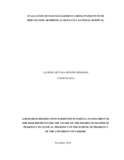| dc.description.abstract | Background: Rheumatoid arthritis is a progressive chronic autoimmune systemic inflammatory disease that causes significant pain, functional disability and joint destruction. Pain is the most distressing symptom of this disease and thus largely affects the activities of living of these patients. Despite medications and aggressive forms of treatment, many patients still experience continuous pain and stiffness. There is need to reduce, control and prevent rheumatic pain through proper management of inflammation.
Objective: To evaluate pain management among patients with rheumatoid arthritis at Kenyatta National Hospital between June and September 2018.
Methodology: A cross sectional study was used. One hundred and fifteen patients with a clinical diagnosis of rheumatoid arthritis who met the inclusion criteria from the rheumatology clinic, were conveniently sampled and recruited to the study. Data on pain control was collected using structured questionnaires. Data analysis was carried out using STATA version 14 software. The descriptive data was presented as proportions and frequencies in tables,pie charts and graphs. The association between pain control and other variables was explored using Fischer’s exact test and Logistic regression model. Inferential analysis was carried out at 0.05 level of significance.
Results: One hundred and fifteen participants were enrolled to the study.There was a female predominance (n = 103,89.8%) and a mean age of 48 years old (SD = 16.4). Disease Modifying Anti Rheumatic Drugs were the most prescribed class of drugs (n = 111,96.5%) with methotrexate (n = 74,64.4%) and hydroxychloroquine (n = 50,43.5%) being the most prescribed drugs. Fifty one (44.4%) participants had at least one cormobidity reported. Hypertension being the most prevalent. Abdominal pain and headache were the most reported adverse drug reactions. Low adherence levels were reported in almost three quarters of the participants. The main reasons for non adherence included; lack of finances, severity of the disease,duration of treatment, forgetfulness and drug being unaffordable. Forty eight (51.6%) participants reported experiencing pain on the day of the interview and on average, participants had inadequate pain control. Employment status was a predictor of pain control (COR = 0.085,95% CI = 0.009 - 0.796; P value = 0.031). The unemployed participants had 0.085 times the odds of having adequate pain control compared to their employed counterparts.Walking ability predicted the adequacy of pain control. Participants who reported no interference with their ability to walk were 5.540 times more likely to have adequate pain control (COR = 5.540,95% CI = 1.562-19.660; P=0.008. Normal work and adequacy of pain control were significantly associated (COR = 4.347,95% CI = 1.315 -14.369; P = 0.016). Enjoyment of life was an independent predictor of adequacy of pain control (AOR = 14.075,95% CI = 1.842 - 107.514; P = 0.011). Participants who had no interference with their enjoyment of life had 14.075 times the odds of having adequate pain control when all other factors are held constant. The independent predictors of the level of adherence included; regular exercise (AOR = 4.235,95% CI = 1.131-15.849; P = 0.032), severity of the disease (AOR = 0.171,95% CI = 0.029 - 1.011; P = 0.052), unaffordable drug (AOR = 0.163,95% CI = 0.027 - 0.971; P = 0.046) and relations with other people (AOR = 0.232,95% CI = 0.072 - 0.749; P = 0.015). | en_US |
| dc.description.department | a
Department of Psychiatry, University of Nairobi, ; bDepartment of Mental Health, School of Medicine,
Moi University, Eldoret, Kenya | |



